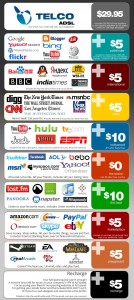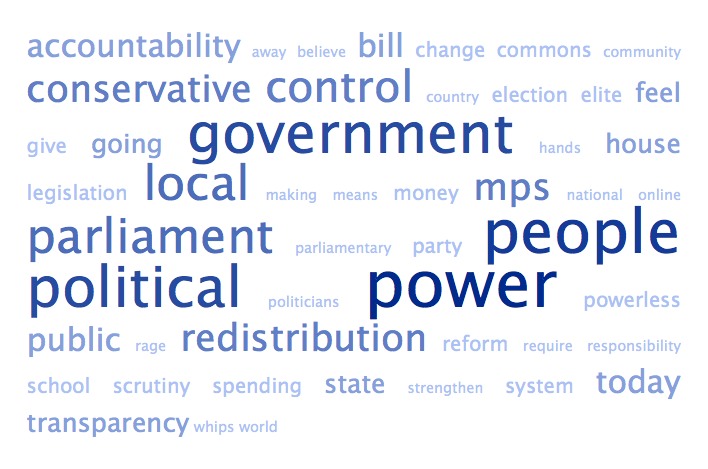One of the interesting side-effects of Twitter is that it liberates bloggers from one of their original duties — that of providing a set of links to interesting stuff elsewhere on the Web. That, after all, is where the genre originated — as weblogs which were just that, a list of links to other sites. In that sense, the first blogger was Tim Berners-Lee, the Web’s inventor, because one of the first pages he published on CERN’s server (info.cern.ch) was a daily-updated list of other web servers.
As the web grew, and pioneers like Dave Winer began to explore what could be done with this new publishing medium, a consensus emerged that a weblog should be more than just a set of links — that there should be at least some kind of annotation or comment accompanying the links. And so Blogging was born and rapidly morphed into a literary form which uneasily mixed link-logs with heavily hyperlinked prose pieces of varying length, profundity and authority.
I started blogging in the mid-1990s because I needed a way of creating a hyperlinked notebook to keep track of my online reading and to support my academic and journalistic work. I had discovered that if one spent any amount of time on the Web then simple, browser-based bookmarking rapidly became dysfunctional. I first used a tool called AOLPress which was free and lightweight (and which, I learned much later from TB-L’s memoir, had very respectable antecedents). For the first few years, my blog was effectively private — it was hosted on my own computers and not available on the Web. This made sense at the time because it really was more like a lab notebook than a literary product: it was a way of enabling me to escape the consequences of a poor memory, especially once I’d put a search engine onto it. I knew from then on that if I’d written about it on my blog then I would always be able to retrieve it later.
Memex went public towards the end of the 1990s after I’d started to use Dave Winer’s Userland software. But going public involved an uneasy compromise. The terseness of the private blog had to be softened, somehow, by some degree of elaboration, explanation or exposition. Otherwise, readers might have no idea of what lay behind a particular link or observation. So from the moment Memex went public it’s oscillated between weblog and blog, with a strong bias towards the former. Every so often, I would post extended pieces which were more or less polished (usually the latter), but for most of the time Memex has been mainly a rushed, idiosyncratic guide to things I have found interesting, instructive or significant. In that sense it sits at the opposite end of the spectrum from blogs whose posts are well-formed, carefully-crafted mini-essays: like, say, those written by the venerable Chicago firm of Becker & Posner, or by Paul Graham, Ed Felten, Clay Shirky, Diane Coyle, Martin Weller, Bill Thompson, or Sean French & Nicci Gerrard — to pick just a few names at random from my blogroll.
The great thing about social bookmarking services like del.icio.us and Twitter is that they could liberate bloggers from the weblogging side of their lives and allow them to concentrate on, well, online essays. Which of course raises the question of what is an ‘essay’. As chance would have it, this is a subject discussed by Zadie Smith in the introduction to her splendid new collection of the things, Changing My Mind: Occasional Essays.
As a noun, Smith observes, the word ‘essay’ has had “an unstable history, shape-shifting over the centuries in its little corner of the OED”.
For Samuel Johnson in 1755 it is: “A loose sally of the mind; an irregular undigested piece; not a regularly and orderly composition.” And if this looks to us like one of Johnson’s lexical eccentricities, we’re chastened to find Joseph Addison, of all people, in agreement (“The wildness of these compositions that go by the name of essays”) and behind them both three centuries of vaguely negative connotation. Beginning in the 1500s an essay is: the action or process of trying or testing; a sample, an example; a rehearsal; an attempt or endeavour; a trying to do something; a rough copy; a first draft. Not until the mid 19th century does it take on its familiar, neutral ring: “a composition more or less elaborate in style, though limited in range.”
Johnson’s definition seems to me to fit many of the longer posts one finds on the best blogs. They’re full of ideas, but not quite polished or honed: work in progress rather than finished products. As someone who has written a weekly mini-essay for (print) publication in a national magazine or newspaper for 50 weeks a year since 1982, I’m often struck by the differences between my Observer column and what I post here. In part, this is a response to the constraints laid upon one by a print publication; although my column is published (and widely read) online, its most important parameter — length — is set by the requirements of the page on which it sits in the print edition of the newspaper. So when I sit down to write a column, I know that whatever I have to say has to be fitted into 800 words.
Such a limitation makes no sense on the Web, where space is, in theory, infinite. But in fact the discipline imposed by the 800-word limit seems to me to be a beneficial thing. For one thing, it discourages prolixity and encourages brevity. As someone who agrees with Wittgenstein’s dictum that “if a thing can be said then it can be said simply clearly”* I rather like that.
An 800-word limit has other benefits too. It reminds one, for example, that readers’ time is precious and that one shouldn’t waste it. Space may be abundant on the Web, but attention is an increasingly scarce resource in this networked world. As Herbert Simon put it:
In an information-rich world, the wealth of information means a dearth of something else: a scarcity of whatever it is that information consumes, What information consumes is rather obvious: it consumes the attention of its recipients. Hence a wealth of information creates a poverty of attention and a need to allocate that attention efficiently among the overabundance of information sources that might consume it.
Simon wrote that in 1971, long before the Web was created and just when the Arpanet was getting into its stride, but it seems spot-on for today’s circumstances.
The other difference between writing for print and writing for one’s blog is that there comes a moment with the print essay when it has to be ‘finished’ and dispatched to the sub-editors: there’s an ‘end-point’, in other words. But, in a sense, a blog post is never ‘finished’; there’s always the possible of ongoing revision in the light of comments, or second thoughts, or sheer, unreasoning loss of nerve. You could say, therefore, that writing for print is like sculpting in stone, whereas writing for a blog is like sculpting in jelly that hasn’t quite set.
So kindly stand aside while I pour…
*FOOTNOTE: Shortly after this was posted, my learned colleague, Doug Clow, corrected the Wittgenstein quote.


